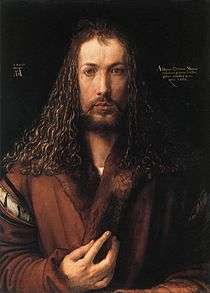Adoration of the Magi (Dürer)
The Adoration of the Magi is a 1504 oil-on-wood painting by Albrecht Dürer. It was commissioned by Frederick the Wise for the altar of the Schlosskirche in Wittenberg, and is considered one of Dürer's best and most important works from the period between his first and second trips to Italy (1494-5 and 1505).[1][2] The second king is a selfportrait of Dürer .¨This painting was very influential for other Renaissance painters like Pieter Coecke van Aelst.
In 1603 Christian II of Saxony presented the painting as a gift to the Holy Roman Emperor Rudolf II.[3] It remained in the imperial collection in Vienna until 1792, when Luigi Lanzi, the director of the Uffizi, acquired it in exchange for Fra Bartolomeo's Presentation in the Temple.[4]
Some art historians suggest that this painting could have been the central panel of the Jabach Altarpiece.[2]
References
- ↑ Wölfflin, Heinrich (1905). Die Kunst Albrecht Dürers. Munich: F Bruckmann. pp. 154–155.
- 1 2 Costantino Porcu, ed. (2004). Dürer. Milan: Rizzoli. p. 112.
- ↑ Gloria Fossi, Uffizi , Giunti, Florence 2004. P. 346. ISBN 88-09-03675-1
- ↑ "Darbringung Christi im Tempel" Archived 2015-03-13 at the Wayback Machine. in the catalog of the Kunsthistorisches Museum Wien
External links

- The Adoration of the Magi on the Web Gallery of Art
- The Adoration of the Magi in the Uffizi's official catalog
Sources
- Costantino Porcu, ed. (2004). Dürer. Milan: Rizzoli. p. 112.

